because的用法及短语
because用法归纳总结
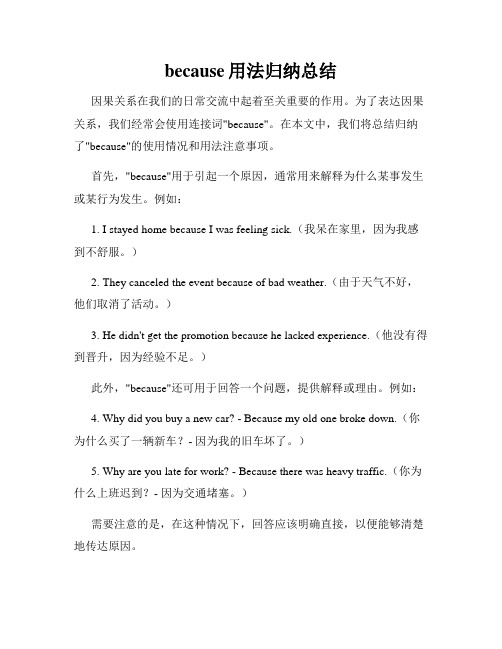
because用法归纳总结因果关系在我们的日常交流中起着至关重要的作用。
为了表达因果关系,我们经常会使用连接词"because"。
在本文中,我们将总结归纳了"because"的使用情况和用法注意事项。
首先,"because"用于引起一个原因,通常用来解释为什么某事发生或某行为发生。
例如:1. I stayed home because I was feeling sick.(我呆在家里,因为我感到不舒服。
)2. They canceled the event because of bad weather.(由于天气不好,他们取消了活动。
)3. He didn't get the promotion because he lacked experience.(他没有得到晋升,因为经验不足。
)此外,"because"还可用于回答一个问题,提供解释或理由。
例如:4. Why did you buy a new car? - Because my old one broke down.(你为什么买了一辆新车?- 因为我的旧车坏了。
)5. Why are you late for work? - Because there was heavy traffic.(你为什么上班迟到?- 因为交通堵塞。
)需要注意的是,在这种情况下,回答应该明确直接,以便能够清楚地传达原因。
此外,"because"还可以与副词或短语一起使用,以提供更详细的原因解释。
例如:6. They couldn't attend the party because they were out of town.(他们不能参加派对,因为他们不在城里。
)7. He failed the exam because he didn't study enough.(他考试没通过,因为他没学够。
because的用法和短语例句
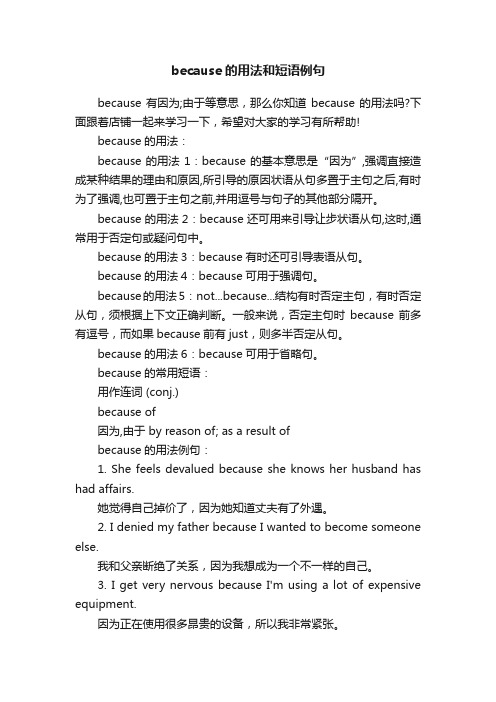
because的用法和短语例句because有因为;由于等意思,那么你知道because的用法吗?下面跟着店铺一起来学习一下,希望对大家的学习有所帮助!because的用法:because的用法1:because的基本意思是“因为”,强调直接造成某种结果的理由和原因,所引导的原因状语从句多置于主句之后,有时为了强调,也可置于主句之前,并用逗号与句子的其他部分隔开。
because的用法2:because还可用来引导让步状语从句,这时,通常用于否定句或疑问句中。
because的用法3:because有时还可引导表语从句。
because的用法4:because可用于强调句。
because的用法5:not...because...结构有时否定主句,有时否定从句,须根据上下文正确判断。
一般来说,否定主句时because前多有逗号,而如果because前有just,则多半否定从句。
because的用法6:because可用于省略句。
because的常用短语:用作连词 (conj.)because of因为,由于 by reason of; as a result ofbecause的用法例句:1. She feels devalued because she knows her husband has had affairs.她觉得自己掉价了,因为她知道丈夫有了外遇。
2. I denied my father because I wanted to become someone else.我和父亲断绝了关系,因为我想成为一个不一样的自己。
3. I get very nervous because I'm using a lot of expensive equipment.因为正在使用很多昂贵的设备,所以我非常紧张。
4. Because you're not burning calories, everything you eat turns to fat.由于没有消耗卡路里,你吃的所有东西都会变成脂肪。
because的用法总结
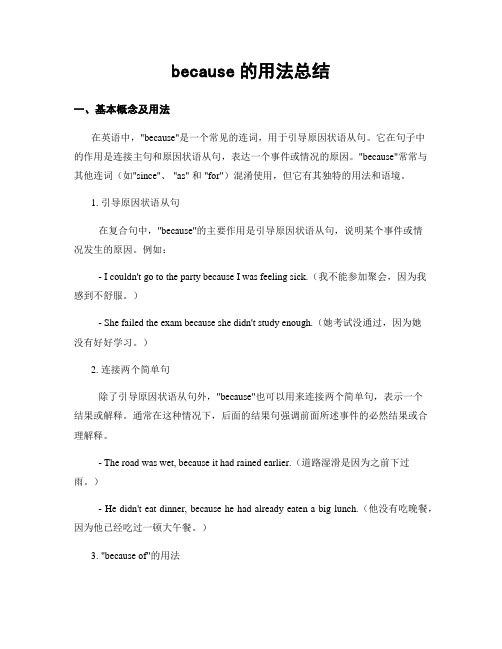
because的用法总结一、基本概念及用法在英语中,"because"是一个常见的连词,用于引导原因状语从句。
它在句子中的作用是连接主句和原因状语从句,表达一个事件或情况的原因。
"because"常常与其他连词(如"since"、 "as" 和 "for")混淆使用,但它有其独特的用法和语境。
1. 引导原因状语从句在复合句中,"because"的主要作用是引导原因状语从句,说明某个事件或情况发生的原因。
例如:- I couldn't go to the party because I was feeling sick.(我不能参加聚会,因为我感到不舒服。
)- She failed the exam because she didn't study enough.(她考试没通过,因为她没有好好学习。
)2. 连接两个简单句除了引导原因状语从句外,"because"也可以用来连接两个简单句,表示一个结果或解释。
通常在这种情况下,后面的结果句强调前面所述事件的必然结果或合理解释。
- The road was wet, because it had rained earlier.(道路湿滑是因为之前下过雨。
)- He didn't eat dinner, because he had already eaten a big lunch.(他没有吃晚餐,因为他已经吃过一顿大午餐。
)3. "because of"的用法除了单独使用"because"引导原因状语从句外,还可以以"because of"的形式引导介词短语,在句子中充当介词宾语。
"because of" 后面通常跟名词或动名词。
because的六点用法
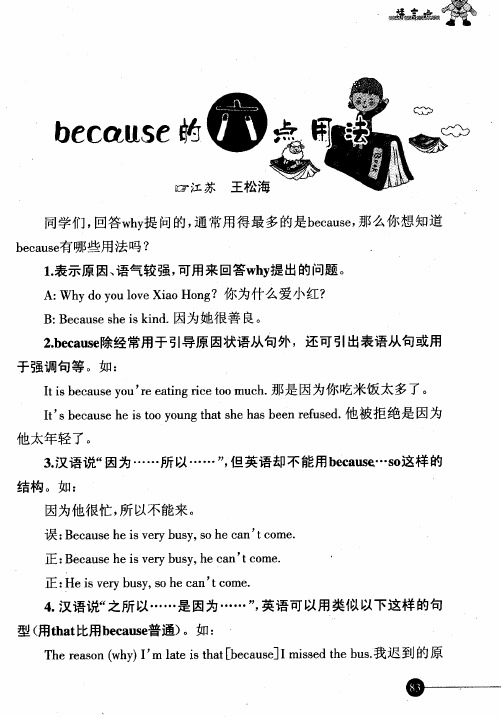
Y o u s h o u l d n ’ t g e t a n g r y j u s t b e c a u s e s o m e p e o p l e s p e a k i l l o f y o u . 你 不 要 因为有 人说你 坏话 而生气 。
结 构 。如 :
因为他 很忙 , 所 以不 能来 。
误: B e c a u s e h e i s v e r y b u s y , s o h e c a n ’ t c o m e .
正: B e c a u s e h e i s v e y r b u s y , h e c a n’ t c o me . 正: He i s v e r y b u s y , S O h e c a n’ t c o me . ’
B : B e c a u s e s h e i s k i n d . 因 为她很 善 良。
2 . b e c a u s e 除经 常用 于 引导原 因状 语从 句外 ,还 可 引 出表语 从句 或 用
于 强调句 等 。如 : I t i s b e c a u s e y o u ’ r e e a t i n g r i c e t o o m u c h . 那 是 因为你 吃米饭 太 多 了。
I t ’ s b e c a u s e h e i s t o 0 y o u n g t h a t s h e h a s b e e n r e f u s e d . 他 被拒 绝 是 因 为
他 太年轻 了。 3 . 汉 语 说“ 因为 … …所 以… … ” , 但 英语 却 不 能 用b e c a u s e …S O 这样 的
6 . 由于b e c a u s e o f 用 作 复合 介 词 , 其 后 可接 名 词 、 代词、 动名 词 、 wh a t
because知识点用法

because知识点用法在英语中,单词"because"是一个连词,用于表示原因或解释。
它将一个原因与一个结果进行连接,使得语句更加连贯和合理。
以下是一些关于"because"连词的常见用法和例句:1. 使用"because"引导原因状语从句:"I couldn't attend the party because I had to work late."(我不能参加派对,因为我得工作到很晚。
)2. 使用"because of"表达原因或解释:"He couldn't come to the meeting because of a family emergency."(他因为家庭紧急情况无法参加会议。
)3. "because"后面通常跟着完整的句子,而不是短语或单词:错误示范:I didn't go out because raining.正确示范:I didn't go out because it was raining.(我没出门,因为下雨了。
)4. "because"可以位于句首或句中,但通常在句子中间使用逗号分隔:"Because it was raining, we decided to stay indoors."(因为下雨了,我们决定呆在室内。
)"We decided to stay indoors because, it was raining."(我们决定呆在室内,因为下雨了。
)请注意,使用"because"时应注意以下几点:- 不要滥用"because",过多的使用会使句子变得累赘。
- 避免使用复杂的句子结构,以免造成理解困难。
英语常用词汇because的用法
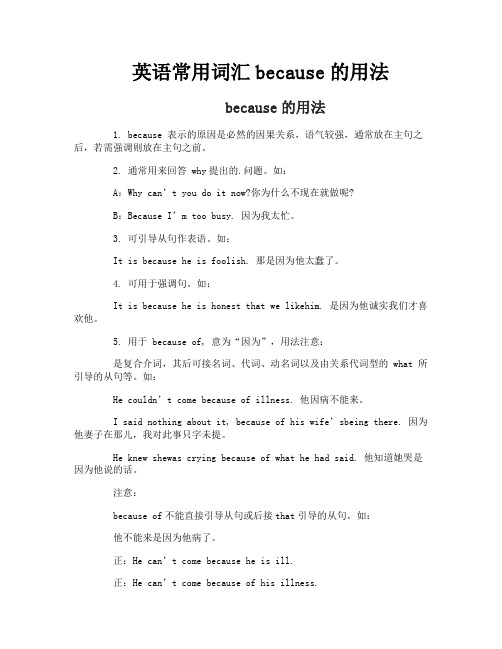
英语常用词汇because的用法because的用法1. because 表示的原因是必然的因果关系,语气较强,通常放在主句之后,若需强调则放在主句之前。
2. 通常用来回答 why提出的.问题。
如:A:Why can’t you do it now?你为什么不现在就做呢?B:Because I’m too busy. 因为我太忙。
3. 可引导从句作表语。
如:It is because he is foolish. 那是因为他太蠢了。
4. 可用于强调句。
如:It is because he is honest that we likehim. 是因为他诚实我们才喜欢他。
5. 用于 because of, 意为“因为”,用法注意:是复合介词,其后可接名词、代词、动名词以及由关系代词型的 what 所引导的从句等。
如:He couldn’t come because of illness. 他因病不能来。
I said nothing about it, because of his wife’sbeing there. 因为他妻子在那儿,我对此事只字未提。
He knew shewas crying because of what he had said. 他知道她哭是因为他说的话。
注意:because of不能直接引导从句或后接that引导的从句。
如:他不能来是因为他病了。
正:He can’t come because he is ill.正:He can’t come because of his illness.误:He can’t come because of he is ill.误:He can’t come because of that he is ill.because of 一般引导状语,不引导表语。
如:正:His absence is due to the rain. 他因雨未来。
because的用法和位置 (2)
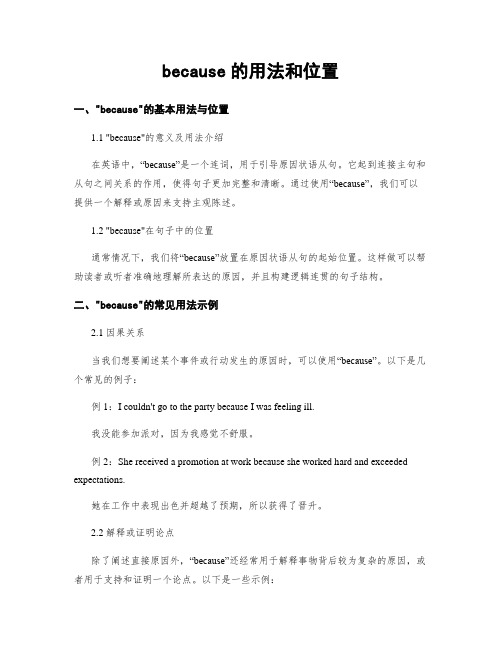
because的用法和位置一、"because"的基本用法与位置1.1 "because"的意义及用法介绍在英语中,“because”是一个连词,用于引导原因状语从句。
它起到连接主句和从句之间关系的作用,使得句子更加完整和清晰。
通过使用“because”,我们可以提供一个解释或原因来支持主观陈述。
1.2 "because"在句子中的位置通常情况下,我们将“because”放置在原因状语从句的起始位置。
这样做可以帮助读者或听者准确地理解所表达的原因,并且构建逻辑连贯的句子结构。
二、"because"的常见用法示例2.1 因果关系当我们想要阐述某个事件或行动发生的原因时,可以使用“because”。
以下是几个常见的例子:例1:I couldn't go to the party because I was feeling ill.我没能参加派对,因为我感觉不舒服。
例2:She received a promotion at work because she worked hard and exceeded expectations.她在工作中表现出色并超越了预期,所以获得了晋升。
2.2 解释或证明论点除了阐述直接原因外,“because”还经常用于解释事物背后较为复杂的原因,或者用于支持和证明一个论点。
以下是一些示例:例3:Many people are interested in learning a new language because it can open up new opportunities for work and travel.很多人对学习一门新语言感兴趣,因为它能为工作和旅行开辟新的机会。
例4:He decided to become a doctor because he wanted to help others and make a positive impact on people's lives.他决定成为一名医生,因为他想帮助他人,并对人们的生活产生积极影响。
because的用法归纳_用法辨析 英语语法.doc

because的用法归纳_用法辨析1. because 表示的是必然的因果关系,语气最强,通常放在主句之后,若需强调则放在主句之前2. 通常用来回答why提出的问题。
如:A:Why can’t you do it now?你为什么不现在就做呢?B:Because I’m too busy. 因为我太忙。
3. 可引导从句作表语。
如:It is because he is foolish. 那是因为他太蠢了。
4. 可用于强调句。
如:It is because he is honest that we likehim. 是因为他诚实我们才喜欢他。
5. notbecause这一结构中的not 有时否定主句,有时否定从句,一般要根据句子的意思作出正确或合乎逻辑的理解。
若not否定主句,最好在because之前用逗号,否则会引起歧义,如下句在没有特定上下文时就有两种解释。
如:I didn’t go because I was afraid.(1) 我没有去是因为怕。
(2) 我不是因为怕才去。
不过若because之前有just修饰,一般认为not 是否定从句而不是主句。
如:You shouldn’t get angry just because some people speakill of you. 你不要因为有人说你坏话而生气。
He was not readyto believe something just because Aristotle said so. 他并不只是因为亚里士多德说过如何如何,就轻易相信它。
6. 表示的原因是因为这一意义时,一般要用下面这样的句型。
如:The reason why he can’t come is that he is tired. 他不能来是因为他累了。
在这一结构中尽管不少人认为可将that改用because, 但也有不少人反对这一用法,学生宜慎用。
7. 汉语习惯上说因为所以,但在英语里却不能将so与because 连用。
- 1、下载文档前请自行甄别文档内容的完整性,平台不提供额外的编辑、内容补充、找答案等附加服务。
- 2、"仅部分预览"的文档,不可在线预览部分如存在完整性等问题,可反馈申请退款(可完整预览的文档不适用该条件!)。
- 3、如文档侵犯您的权益,请联系客服反馈,我们会尽快为您处理(人工客服工作时间:9:00-18:30)。
because的用法及短语
因为(because)是一个常用的连词,它在英语中用于说明原因或解释事物发生的理由。
掌握正确使用 because 的方法对于提高英语表达能力非常重要。
本文将介绍因为的不同用法以及常见的短语,帮助读者准确地运用这个词汇。
一、因为的基本用法
1.连接句子:因为作为连词时,通常用来连接两个句子,引导原因从句,并且放在主要句子之前。
例如:
- I couldn't go to the party because I had to work late.
我不能参加聚会,因为我得工作到很晚。
- He failed his exam because he didn't study.
他考试没通过,原因是他没有学习。
2. 排除其他可能性:当我们使用 because 介绍原因时,强调该原因是唯一或主要的一个。
例如:
- She couldn't find her keys because she left them at home.
她找不到钥匙是因为她把它们留在家里了。
- He felt tired because he had been running all day.
他感到疲倦是因为他整天都在跑步。
二、因为相关短语
1. Because of:because of 是一个由 prep. + n./pronoun 形成的短语,在句中说明原因,并修饰名词或代词。
- He couldn't attend the meeting because of a sudden illness.
因为突发疾病,他无法参加会议。
- She missed the flight because of traffic congestion.
因为交通堵塞,她错过了航班。
2. Just because:just because 是一个固定的短语,在句中表示警告或强调,并表明一个事物不应当被认为是真实的原因。
- Just because it's expensive doesn't mean it's good quality.
光是贵并不意味着它就是好质量的。
- Just because he's your boss, you don't have to agree with everything he says.
仅仅因为他是你的老板,并不意味着你要同意他说的一切。
3. All because:all because 是一个形容整个情况或结果的副词短语,在句中用来表达褒义或贬义情绪,常与否定词组合使用。
- We had to cancel the picnic all because of the rain.
我们不得不因为下雨取消了野餐。
- He lost his job all because of his own laziness.
他失业都怪自己太懒惰了。
4. Because that:because that 在句子中用作引导从句,提供进一步解释或支持主题的原因。
这个词组已经相对较少使用,但在某些文学作品中仍可见到。
- She didn't eat much because that she was feeling sick.
她吃得不多,因为她感觉不舒服。
- He couldn't concentrate on his work because that he had a lot on his mind.
他无法集中注意力工作,因为脑子里有太多烦心事了。
三、因为的常见错误
在使用 because 时,有几个常见的错误需要避免:
1. 分句顺序颠倒:记住要先写原因从句(with because),再写主句。
否则就称之为“前倒后”。
2. 错误使用逗号:不能将逗号放在普通句子之前或之间。
只有在一个独立与完整的从句结束之后,我们才能使用逗号。
3. 疑问句使用错误:不能用 because 引导问句。
如需表达询问原因,请使用why 连词。
总结:
因为是英语中常用且重要的一个连词,在表达原因时扮演着重要的角色。
掌握正确运用基本用法和相关短语可以有效地提高英语表达能力。
记住这些规则,并避免常见的错误,能够帮助读者更加自信流畅地使用英语中的 "because"。
